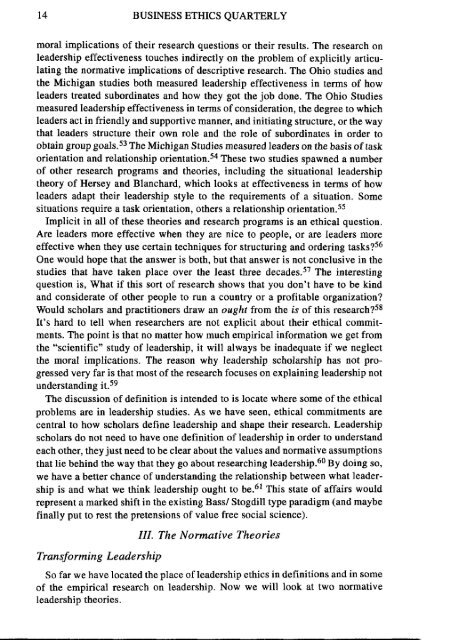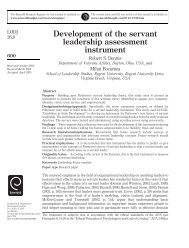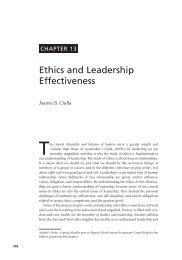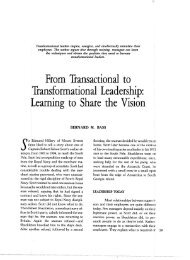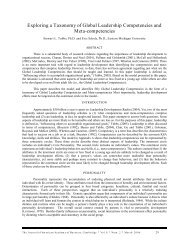LEADERSHIP ETHICS: MAPPING THE TERRITORY - Strand Theory
LEADERSHIP ETHICS: MAPPING THE TERRITORY - Strand Theory
LEADERSHIP ETHICS: MAPPING THE TERRITORY - Strand Theory
Create successful ePaper yourself
Turn your PDF publications into a flip-book with our unique Google optimized e-Paper software.
14 BUSINESS <strong>ETHICS</strong> QUARTERLY<br />
moral implications of their research questions or their results. The research on<br />
leadership effectiveness touches indirectly on the problem of explicitly articulating<br />
the normative implications of descriptive research. The Ohio studies and<br />
the Michigan studies both measured leadership effectiveness in terms of how<br />
leaders treated subordinates and how they got the job done. The Ohio Studies<br />
measured leadership effectiveness in terms of consideration, the degree to which<br />
leaders act in friendly and supportive manner, and initiating structure, or the way<br />
that leaders structure their own role and the role of subordinates in order to<br />
obtain group goals. ^3 The Michigan Studies measured leaders on the basis of task<br />
orientation and relationship orientation.^"* These two studies spawned a number<br />
of other research programs and theories, including the situational leadership<br />
theory of Hersey and Blanchard, which looks at effectiveness in terms of how<br />
leaders adapt their leadership style to the requirements of a situation. Some<br />
situations require a task orientation, others a relationship orientation.^^<br />
Implicit in all of these theories and research programs is an ethical question.<br />
Are leaders more effective when they are nice to people, or are leaders more<br />
effective when they use certain techniques for structuring and ordering tasks?^^<br />
One would hope that the answer is both, but that answer is not conclusive in the<br />
studies that have taken place over the least three decades.^^ The interesting<br />
question is, What if this sort of research shows that you don't have to be kind<br />
and considerate of other people to run a country or a profitable organization?<br />
Would scholars and practitioners draw an ought from the is of this research?^^<br />
It's hard to tell when researchers are not explicit about their ethical commitments.<br />
The point is that no matter how much empirical information we get from<br />
the "scientific" study of leadership, it will always be inadequate if we neglect<br />
the moral implications. The reason why leadership scholarship has not progressed<br />
very far is that most ofthe research focuses on explaining leadership not<br />
understanding it.^^<br />
The discussion of definition is intended to is locate where some of the ethical<br />
problems are in leadership studies. As we have seen, ethical commitments are<br />
central to how scholars define leadership and shape their research. Leadership<br />
scholars do not need to have one definition of leadership in order to understand<br />
each other, they just need to be clear about the values and normative assumptions<br />
that lie behind the way that they go about researching leadership.^" By doing so,<br />
we have a better chance of understanding the relationship between what leadership<br />
is and what we think leadership ought to be.^' This state of affairs would<br />
represent a marked shift in the existing Bass/ Stogdill type paradigm (and maybe<br />
finally put to rest the pretensions of value free social science).<br />
Transforming Leadership<br />
///. The Normative Theories<br />
So far we have located the place of leadership ethics in definitions and in some<br />
of the empirical research on leadership. Now we will look at two normative<br />
leadership theories.


